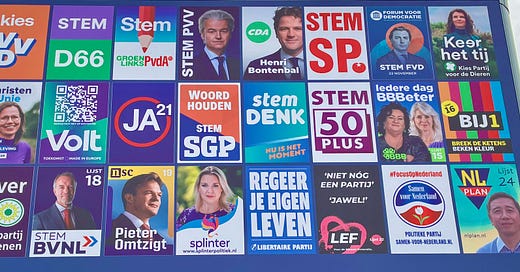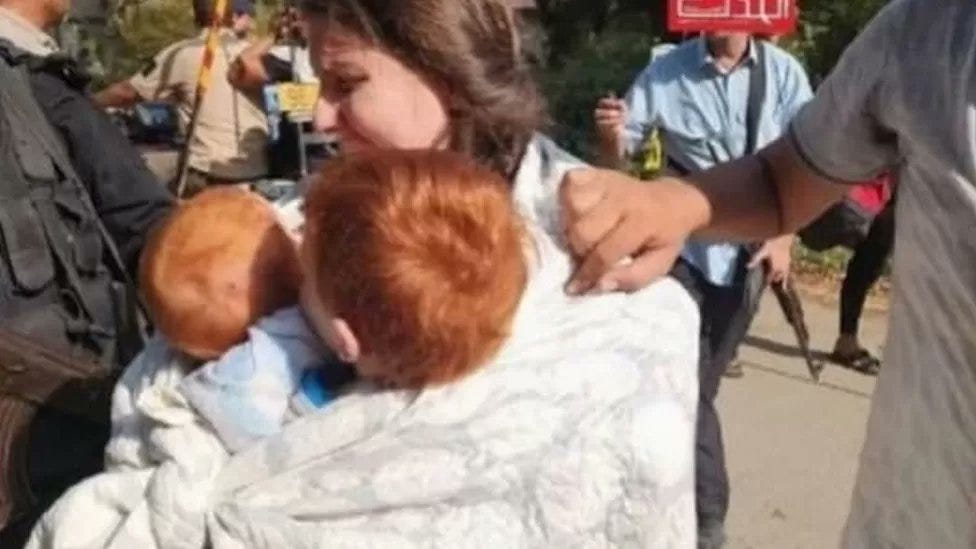Thanks for the comments, likes, new subscriptions and those upgrading to paid. The numbers are up and engagement is increasing and despite the worrying developments all over the world I am enjoying the ride and writing about it. Moreover, with few people ‘unsubscribing’, the churn is very low. There are also lots of links and videos I see and get from you, but I can’t share them all here, most of that goes to my ‘X’ presence.
Hostages
The war in the Middle East has propelled this newsletter forward and six weeks into it we have still seen no movement on the hostages. As the IDF is gaining ground in Gaza we are hearing that bodies of a few dead hostages have been being recovered, but no news on the now 239 missing ones although some evidence of their whereabout has been found. In the meantime one mother has given birth while in captivity and baby Kfir has turned 10 months old. The fear in the eyes of mother Shiri while she holds Kfir and brhis other Ariel remains haunting, it was one of the first videos to come out on October 7th. While we were evaluating the most dreadful scenarios for the hostages that day, we could probably not have foreseen that protest movements would deny their existence while media spent less and less time on these poor souls. Not here.
An apparent deal yesterday - 50 hostages released for three days of ceasefire and a release of all female Hamas prisoners - went nowhere, much like any other deal that was concocted behind the scenes over the past little while. Whatever amnesia is gripping the world, I can’t forget the hostages and my heart breaks every time I see video or family testimonies. Bring them back now.
The Dutch Laboratory
My long time readers will know that I cover a wide array of subjects here, in particular political trends that have wider global implications. One of them is The Netherlands where next week general elections will be held and the trends that we have seen during the campaign so far point to the pain and struggles of most western democracies. And no, it is not Israel or Hamas. Or in this case the Dutch farmers. Nor is it Russia and Ukraine or China and Taiwan, all of which have become side shows in this election. Even the climate debate has gone down to a much lower tier.
No an extremely large number of parties is vying to gain seats in parliament by addressing these core voters concerns: housing availability, healthcare, poverty and the factor that puts serious pressure on all of these three: immigration. Decades of neo-Liberal deregulation, open borders and matching budgetary policies have created unprecedented gaps in access to a lot of basic needs. And it is not that the nation is poorer, no, The Netherlands is an incredible economic success. It is just that an ever larger proportion of the population has no access to that prosperity and faces a ‘wealth gap’ that is becoming quite insurmountable.
There are four parties that have taken a clear lead, only one of which is progressive and that is the merged Green Left and Labour combination under former Vice President of the European Commission, Frans Timmermans. More to the centre-right is the successor to incumbent Mark Rutte, Dilan Yeşilgöz who is within striking distance of becoming the first female prime minister of The Netherlands, she also brings an interesting Turkish-Kurdish background. Yet she is seen as far less of a ‘wheeler dealer’ than her predecessor as she is taking a pretty principled line on for instance immigration. If she wins, she will have to put together a coalition and for that she can turn to Pieter Omtzigt, who gained notoriety as one of the few politicians to take on the government over the infamous child benefits affair. A soloist known for his deep file knowledge and integrity, he was more or less kicked out of his own party and established a new one, New Social Contract. The new party focuses on revamping Dutch government, he sees its sorry state and byzantine decision making processes as one of the core reasons that the Dutch are so poorly served in these challenging times. He has a very compelling point here, but he’s a bookish econometrist and for direct slogans and clear language the fourth contender, Geert Wilders, looks stronger by the day. He is a rabidly anti-immigrant right-wing non-establishment candidate whose tone and attitudes have left him out of power for most of his career. His anti-Islam stance has given him a round the clock security detail and he now sees an opening to participate in a new government. For that he has struck a more moderate tone and as the only one among the top four, Yeşilgöz has opened the door to work with him if the election results force her to do so. Farmer-Citizen party leader Caroline van der Plas has lost momentum and is trailing, although her party’s strong position in the senate will give her a seat at the table whatever the election outcome.
The deep irony is that there are now right-of-centre parties that are starting to occupy the political space that used to be owned by the traditional left by focusing on housing, care and affordability. The stark contrast between spending billions on climate and the nitrogen-farmer crisis (the minister of agriculture admitted this week that modelling the numbers here was actually faulty) while an ever larger number of people inadvertently find themselves below the poverty line is telling. Add to this a former refugee who is taking a harsh line on immigration and you get a feel as to how political experimentation can turn politics upside down and yield unexpected results. It opens up opportunities for newcomers ready to change a settled consensus and move a country in trouble forward. Next Wednesday we will know how hard and fast the Dutch want to go with these four.




